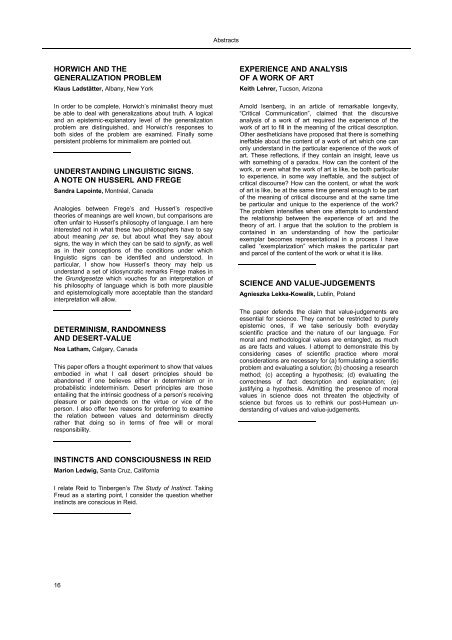Erfahrung und Analyse Experience and Analysis - Austrian Ludwig ...
Erfahrung und Analyse Experience and Analysis - Austrian Ludwig ...
Erfahrung und Analyse Experience and Analysis - Austrian Ludwig ...
Create successful ePaper yourself
Turn your PDF publications into a flip-book with our unique Google optimized e-Paper software.
HORWICH AND THE<br />
GENERALIZATION PROBLEM<br />
Klaus Ladstätter, Albany, New York<br />
In order to be complete, Horwich’s minimalist theory must<br />
be able to deal with generalizations about truth. A logical<br />
<strong>and</strong> an epistemic-explanatory level of the generalization<br />
problem are distinguished, <strong>and</strong> Horwich’s responses to<br />
both sides of the problem are examined. Finally some<br />
persistent problems for minimalism are pointed out.<br />
UNDERSTANDING LINGUISTIC SIGNS.<br />
A NOTE ON HUSSERL AND FREGE<br />
S<strong>and</strong>ra Lapointe, Montréal, Canada<br />
Analogies between Frege’s <strong>and</strong> Husserl’s respective<br />
theories of meanings are well known, but comparisons are<br />
often unfair to Husserl’s philosophy of language. I am here<br />
interested not in what these two philosophers have to say<br />
about meaning per se, but about what they say about<br />
signs, the way in which they can be said to signify, as well<br />
as in their conceptions of the conditions <strong>und</strong>er which<br />
linguistic signs can be identified <strong>and</strong> <strong>und</strong>erstood. In<br />
particular, I show how Husserl’s theory may help us<br />
<strong>und</strong>erst<strong>and</strong> a set of idiosyncratic remarks Frege makes in<br />
the Gr<strong>und</strong>gesetze which vouches for an interpretation of<br />
his philosophy of language which is both more plausible<br />
<strong>and</strong> epistemologically more acceptable than the st<strong>and</strong>ard<br />
interpretation will allow.<br />
DETERMINISM, RANDOMNESS<br />
AND DESERT-VALUE<br />
Noa Latham, Calgary, Canada<br />
This paper offers a thought experiment to show that values<br />
embodied in what I call desert principles should be<br />
ab<strong>and</strong>oned if one believes either in determinism or in<br />
probabilistic indeterminism. Desert principles are those<br />
entailing that the intrinsic goodness of a person’s receiving<br />
pleasure or pain depends on the virtue or vice of the<br />
person. I also offer two reasons for preferring to examine<br />
the relation between values <strong>and</strong> determinism directly<br />
rather that doing so in terms of free will or moral<br />
responsibility.<br />
INSTINCTS AND CONSCIOUSNESS IN REID<br />
Marion Ledwig, Santa Cruz, California<br />
I relate Reid to Tinbergen’s The Study of Instinct. Taking<br />
Freud as a starting point, I consider the question whether<br />
instincts are conscious in Reid.<br />
16<br />
Abstracts<br />
EXPERIENCE AND ANALYSIS<br />
OF A WORK OF ART<br />
Keith Lehrer, Tucson, Arizona<br />
Arnold Isenberg, in an article of remarkable longevity,<br />
“Critical Communication”, claimed that the discursive<br />
analysis of a work of art required the experience of the<br />
work of art to fill in the meaning of the critical description.<br />
Other aestheticians have proposed that there is something<br />
ineffable about the content of a work of art which one can<br />
only <strong>und</strong>erst<strong>and</strong> in the particular experience of the work of<br />
art. These reflections, if they contain an insight, leave us<br />
with something of a paradox. How can the content of the<br />
work, or even what the work of art is like, be both particular<br />
to experience, in some way ineffable, <strong>and</strong> the subject of<br />
critical discourse? How can the content, or what the work<br />
of art is like, be at the same time general enough to be part<br />
of the meaning of critical discourse <strong>and</strong> at the same time<br />
be particular <strong>and</strong> unique to the experience of the work?<br />
The problem intensifies when one attempts to <strong>und</strong>erst<strong>and</strong><br />
the relationship between the experience of art <strong>and</strong> the<br />
theory of art. I argue that the solution to the problem is<br />
contained in an <strong>und</strong>erst<strong>and</strong>ing of how the particular<br />
exemplar becomes representational in a process I have<br />
called “exemplarization” which makes the particular part<br />
<strong>and</strong> parcel of the content of the work or what it is like.<br />
SCIENCE AND VALUE-JUDGEMENTS<br />
Agnieszka Lekka-Kowalik, Lublin, Pol<strong>and</strong><br />
The paper defends the claim that value-judgements are<br />
essential for science. They cannot be restricted to purely<br />
epistemic ones, if we take seriously both everyday<br />
scientific practice <strong>and</strong> the nature of our language. For<br />
moral <strong>and</strong> methodological values are entangled, as much<br />
as are facts <strong>and</strong> values. I attempt to demonstrate this by<br />
considering cases of scientific practice where moral<br />
considerations are necessary for (a) formulating a scientific<br />
problem <strong>and</strong> evaluating a solution; (b) choosing a research<br />
method; (c) accepting a hypothesis; (d) evaluating the<br />
correctness of fact description <strong>and</strong> explanation; (e)<br />
justifying a hypothesis. Admitting the presence of moral<br />
values in science does not threaten the objectivity of<br />
science but forces us to rethink our post-Humean <strong>und</strong>erst<strong>and</strong>ing<br />
of values <strong>and</strong> value-judgements.












